- Home
- George Orwell
1984 Page 2
1984 Read online
Page 2
The next moment a hideous, grinding speech, as of some monstrous machine running without oil, burst from the big telescreen at the end of the room. It was a noise that set one's teeth on edge and bristled the hair at the back of one's neck. The Hate had started.
As usual, the face of Emmanuel Goldstein, the Enemy of the People, had flashed on to the screen. There were hisses here and there among the audience. The little sandy-haired woman gave a squeak of mingled fear and disgust. Goldstein was the renegade and backslider who once, long ago (how long ago, nobody quite remembered), had been one of the leading figures of the Party, almost on a level with Big Brother himself, and then had engaged in counter-revolutionary activities, had been condemned to death, and had mysteriously escaped and disappeared. The programmes of the Two Minutes Hate varied from day to day, but there was none in which Goldstein was not the principal figure. He was the primal traitor, the earliest defiler of the Party's purity. All subsequent crimes against the Party, all treacheries, acts of sabotage, heresies, deviations, sprang directly out of his teaching. Somewhere or other he was still alive and hatching his conspiracies: perhaps somewhere beyond the sea, under the protection of his foreign paymasters, perhaps even — so it was occasionally rumoured — in some hiding-place in Oceania itself.
Winston's diaphragm was constricted. He could never see the face of Goldstein without a painful mixture of emotions. It was a lean Jewish face, with a great fuzzy aureole of white hair and a small goatee beard — a clever face, and yet somehow inherently despicable, with a kind of senile silliness in the long thin nose, near the end of which a pair of spectacles was perched. It resembled the face of a sheep, and the voice, too, had a sheep-like quality. Goldstein was delivering his usual venomous attack upon the doctrines of the Party — an attack so exaggerated and perverse that a child should have been able to see through it, and yet just plausible enough to fill one with an alarmed feeling that other people, less level-headed than oneself, might be taken in by it. He was abusing Big Brother, he was denouncing the dictatorship of the Party, he was demanding the immediate conclusion of peace with Eurasia, he was advocating freedom of speech, freedom of the Press, freedom of assembly, freedom of thought, he was crying hysterically that the revolution had been betrayed — and all this in rapid polysyllabic speech which was a sort of parody of the habitual style of the orators of the Party, and even contained Newspeak words: more Newspeak words, indeed, than any Party member would normally use in real life. And all the while, lest one should be in any doubt as to the reality which Goldstein's specious claptrap covered, behind his head on the telescreen there marched the endless columns of the Eurasian army — row after row of solid-looking men with expressionless Asiatic faces, who swam up to the surface of the screen and vanished, to be replaced by others exactly similar. The dull rhythmic tramp of the soldiers' boots formed the background to Goldstein's bleating voice.
Before the Hate had proceeded for thirty seconds, uncontrollable exclamations of rage were breaking out from half the people in the room. The self-satisfied sheep-like face on the screen, and the terrifying power of the Eurasian army behind it, were too much to be borne: besides, the sight or even the thought of Goldstein produced fear and anger automatically. He was an object of hatred more constant than either Eurasia or Eastasia, since when Oceania was at war with one of these Powers it was generally at peace with the other. But what was strange was that although Goldstein was hated and despised by everybody, although every day and a thousand times a day, on platforms, on the telescreen, in newspapers, in books, his theories were refuted, smashed, ridiculed, held up to the general gaze for the pitiful rubbish that they were in spite of all this, his influence never seemed to grow less. Always there were fresh dupes waiting to be seduced by him. A day never passed when spies and saboteurs acting under his directions were not unmasked by the Thought Police. He was the commander of a vast shadowy army, an underground network of conspirators dedicated to the overthrow of the State. The Brotherhood, its name was supposed to be. There were also whispered stories of a terrible book, a compendium of all the heresies, of which Goldstein was the author and which circulated clandestinely here and there. It was a book without a title. People referred to it, if at all, simply as the book. But one knew of such things only through vague rumours. Neither the Brotherhood nor the book was a subject that any ordinary Party member would mention if there was a way of avoiding it.
In its second minute the Hate rose to a frenzy. People were leaping up and down in their places and shouting at the tops of their voices in an effort to drown the maddening bleating voice that came from the screen. The little sandy-haired woman had turned bright pink, and her mouth was opening and shutting like that of a landed fish. Even O'Brien's heavy face was flushed. He was sitting very straight in his chair, his powerful chest swelling and quivering as though he were standing up to the assault of a wave. The dark-haired girl behind Winston had begun crying out 'Swine! Swine! Swine!' and suddenly she picked up a heavy Newspeak dictionary and flung it at the screen. It struck Goldstein's nose and bounced off; the voice continued inexorably. In a lucid moment Winston found that he was shouting with the others and kicking his heel violently against the rung of his chair. The horrible thing about the Two Minutes Hate was not that one was obliged to act a part, but, on the contrary, that it was impossible to avoid joining in. Within thirty seconds any pretence was always unnecessary. A hideous ecstasy of fear and vindictiveness, a desire to kill, to torture, to smash faces in with a sledge-hammer, seemed to flow through the whole group of people like an electric current, turning one even against one's will into a grimacing, screaming lunatic. And yet the rage that one felt was an abstract, undirected emotion which could be switched from one object to another like the flame of a blowlamp. Thus, at one moment Winston's hatred was not turned against Goldstein at all, but, on the contrary, against Big Brother, the Party, and the Thought Police; and at such moments his heart went out to the lonely, derided heretic on the screen, sole guardian of truth and sanity in a world of lies. And yet the very next instant he was at one with the people about him, and all that was said of Goldstein seemed to him to be true. At those moments his secret loathing of Big Brother changed into adoration, and Big Brother seemed to tower up, an invincible, fearless protector, standing like a rock against the hordes of Asia, and Goldstein, in spite of his isolation, his helplessness, and the doubt that hung about his very existence, seemed like some sinister enchanter, capable by the mere power of his voice of wrecking the structure of civilization.
It was even possible, at moments, to switch one's hatred this way or that by a voluntary act. Suddenly, by the sort of violent effort with which one wrenches one's head away from the pillow in a nightmare, Winston succeeded in transferring his hatred from the face on the screen to the dark-haired girl behind him. Vivid, beautiful hallucinations flashed through his mind. He would flog her to death with a rubber truncheon. He would tie her naked to a stake and shoot her full of arrows like Saint Sebastian. He would ravish her and cut her throat at the moment of climax. Better than before, moreover, he realized why it was that he hated her. He hated her because she was young and pretty and sexless, because he wanted to go to bed with her and would never do so, because round her sweet supple waist, which seemed to ask you to encircle it with your arm, there was only the odious scarlet sash, aggressive symbol of chastity.
The Hate rose to its climax. The voice of Goldstein had become an actual sheep's bleat, and for an instant the face changed into that of a sheep. Then the sheep-face melted into the figure of a Eurasian soldier who seemed to be advancing, huge and terrible, his sub-machine gun roaring, and seeming to spring out of the surface of the screen, so that some of the people in the front row actually flinched backwards in their seats. But in the same moment, drawing a deep sigh of relief from everybody, the hostile figure melted into the face of Big Brother, black-haired, black-moustachio'd, full of power and mysterious calm, and so vast that it almost filled up the screen. Nobo
dy heard what Big Brother was saying. It was merely a few words of encouragement, the sort of words that are uttered in the din of battle, not distinguishable individually but restoring confidence by the fact of being spoken. Then the face of Big Brother faded away again, and instead the three slogans of the Party stood out in bold capitals:
WAR IS PEACE
FREEDOM IS SLAVERY
IGNORANCE IS STRENGTH
But the face of Big Brother seemed to persist for several seconds on the screen, as though the impact that it had made on everyone's eyeballs was too vivid to wear off immediately. The little sandyhaired woman had flung herself forward over the back of the chair in front of her. With a tremulous murmur that sounded like 'My Saviour!' she extended her arms towards the screen. Then she buried her face in her hands. It was apparent that she was uttering a prayer.
At this moment the entire group of people broke into a deep, slow, rhythmical chant of 'B-B! ...B-B!' — over and over again, very slowly, with a long pause between the first 'B' and the second-a heavy, murmurous sound, somehow curiously savage, in the background of which one seemed to hear the stamp of naked feet and the throbbing of tom-toms. For perhaps as much as thirty seconds they kept it up. It was a refrain that was often heard in moments of overwhelming emotion. Partly it was a sort of hymn to the wisdom and majesty of Big Brother, but still more it was an act of self-hypnosis, a deliberate drowning of consciousness by means of rhythmic noise. Winston's entrails seemed to grow cold. In the Two Minutes Hate he could not help sharing in the general delirium, but this sub-human chanting of 'B-B! ...B-B!' always filled him with horror. Of course he chanted with the rest: it was impossible to do otherwise. To dissemble your feelings, to control your face, to do what everyone else was doing, was an instinctive reaction. But there was a space of a couple of seconds during which the expression of his eyes might conceivably have betrayed him. And it was exactly at this moment that the significant thing happened — if, indeed, it did happen.
Momentarily he caught O'Brien's eye. O'Brien had stood up. He had taken off his spectacles and was in the act of resettling them on his nose with his characteristic gesture. But there was a fraction of a second when their eyes met, and for as long as it took to happen Winston knew-yes, he knew!-that O'Brien was thinking the same thing as himself. An unmistakable message had passed. It was as though their two minds had opened and the thoughts were flowing from one into the other through their eyes. 'I am with you,' O'Brien seemed to be saying to him. 'I know precisely what you are feeling. I know all about your contempt, your hatred, your disgust. But don't worry, I am on your side!' And then the flash of intelligence was gone, and O'Brien's face was as inscrutable as everybody else's.
That was all, and he was already uncertain whether it had happened. Such incidents never had any sequel. All that they did was to keep alive in him the belief, or hope, that others besides himself were the enemies of the Party. Perhaps the rumours of vast underground conspiracies were true after all — perhaps the Brotherhood really existed! It was impossible, in spite of the endless arrests and confessions and executions, to be sure that the Brotherhood was not simply a myth. Some days he believed in it, some days not. There was no evidence, only fleeting glimpses that might mean anything or nothing: snatches of overheard conversation, faint scribbles on lavatory walls — once, even, when two strangers met, a small movement of the hand which had looked as though it might be a signal of recognition. It was all guesswork: very likely he had imagined everything. He had gone back to his cubicle without looking at O'Brien again. The idea of following up their momentary contact hardly crossed his mind. It would have been inconceivably dangerous even if he had known how to set about doing it. For a second, two seconds, they had exchanged an equivocal glance, and that was the end of the story. But even that was a memorable event, in the locked loneliness in which one had to live.
Winston roused himself and sat up straighter. He let out a belch. The gin was rising from his stomach.
His eyes re-focused on the page. He discovered that while he sat helplessly musing he had also been writing, as though by automatic action. And it was no longer the same cramped, awkward handwriting as before. His pen had slid voluptuously over the smooth paper, printing in large neat capitals -
DOWN WITH BIG BROTHER
DOWN WITH BIG BROTHER
DOWN WITH BIG BROTHER
DOWN WITH BIG BROTHER
DOWN WITH BIG BROTHER
over and over again, filling half a page.
He could not help feeling a twinge of panic. It was absurd, since the writing of those particular words was not more dangerous than the initial act of opening the diary, but for a moment he was tempted to tear out the spoiled pages and abandon the enterprise altogether.
He did not do so, however, because he knew that it was useless. Whether he wrote DOWN WITH BIG BROTHER, or whether he refrained from writing it, made no difference. Whether he went on with the diary, or whether he did not go on with it, made no difference. The Thought Police would get him just the same. He had committed — would still have committed, even if he had never set pen to paper — the essential crime that contained all others in itself. Thoughtcrime, they called it. Thoughtcrime was not a thing that could be concealed for ever. You might dodge successfully for a while, even for years, but sooner or later they were bound to get you.
It was always at night — the arrests invariably happened at night. The sudden jerk out of sleep, the rough hand shaking your shoulder, the lights glaring in your eyes, the ring of hard faces round the bed. In the vast majority of cases there was no trial, no report of the arrest. People simply disappeared, always during the night. Your name was removed from the registers, every record of everything you had ever done was wiped out, your one-time existence was denied and then forgotten. You were abolished, annihilated: vaporized was the usual word.
For a moment he was seized by a kind of hysteria. He began writing in a hurried untidy scrawl:
theyll shoot me i don't care theyll shoot me in the back of the neck i dont care down with big brother they always shoot you in the back of the neck i dont care down with big brother —
He sat back in his chair, slightly ashamed of himself, and laid down the pen. The next moment he started violently. There was a knocking at the door.
Already! He sat as still as a mouse, in the futile hope that whoever it was might go away after a single attempt. But no, the knocking was repeated. The worst thing of all would be to delay. His heart was thumping like a drum, but his face, from long habit, was probably expressionless. He got up and moved heavily towards the door.
Chapter 2
As he put his hand to the door-knob Winston saw that he had left the diary open on the table. DOWN WITH BIG BROTHER was written all over it, in letters almost big enough to be legible across the room. It was an inconceivably stupid thing to have done. But, he realized, even in his panic he had not wanted to smudge the creamy paper by shutting the book while the ink was wet.
He drew in his breath and opened the door. Instantly a warm wave of relief flowed through him. A colourless, crushed-looking woman, with wispy hair and a lined face, was standing outside.
'Oh, comrade,' she began in a dreary, whining sort of voice, 'I thought I heard you come in. Do you think you could come across and have a look at our kitchen sink? It's got blocked up and-'
It was Mrs Parsons, the wife of a neighbour on the same floor. ('Mrs' was a word somewhat discountenanced by the Party — you were supposed to call everyone 'comrade' — but with some women one used it instinctively.) She was a woman of about thirty, but looking much older. One had the impression that there was dust in the creases of her face. Winston followed her down the passage. These amateur repair jobs were an almost daily irritation. Victory Mansions were old flats, built in 1930 or thereabouts, and were falling to pieces. The plaster flaked constantly from ceilings and walls, the pipes burst in every hard frost, the roof leaked whenever there was snow, the heating system was usually running
at half steam when it was not closed down altogether from motives of economy. Repairs, except what you could do for yourself, had to be sanctioned by remote committees which were liable to hold up even the mending of a window-pane for two years.
'Of course it's only because Tom isn't home,' said Mrs Parsons vaguely.
The Parsons' flat was bigger than Winston's, and dingy in a different way. Everything had a battered, trampled-on look, as though the place had just been visited by some large violent animal. Games impedimenta — hockey-sticks, boxing-gloves, a burst football, a pair of sweaty shorts turned inside out — lay all over the floor, and on the table there was a litter of dirty dishes and dog-eared exercise-books. On the walls were scarlet banners of the Youth League and the Spies, and a full-sized poster of Big Brother. There was the usual boiled-cabbage smell, common to the whole building, but it was shot through by a sharper reek of sweat, which-one knew this at the first sniff, though it was hard to say how was the sweat of some person not present at the moment. In another room someone with a comb and a piece of toilet paper was trying to keep tune with the military music which was still issuing from the telescreen.
'It's the children,' said Mrs Parsons, casting a half-apprehensive glance at the door. 'They haven't been out today. And of course-'
She had a habit of breaking off her sentences in the middle. The kitchen sink was full nearly to the brim with filthy greenish water which smelt worse than ever of cabbage. Winston knelt down and examined the angle-joint of the pipe. He hated using his hands, and he hated bending down, which was always liable to start him coughing. Mrs Parsons looked on helplessly.

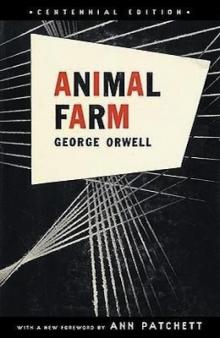 Animal Farm & 1984
Animal Farm & 1984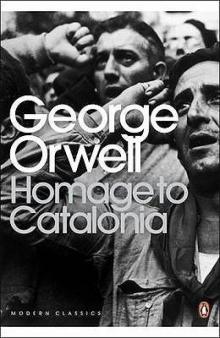 Homage to Catalonia
Homage to Catalonia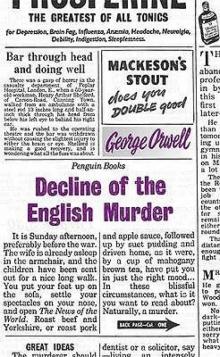 Decline of the English Murder
Decline of the English Murder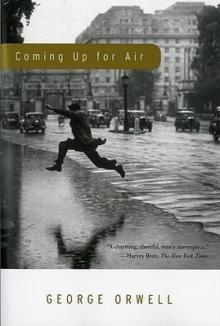 Coming Up for Air
Coming Up for Air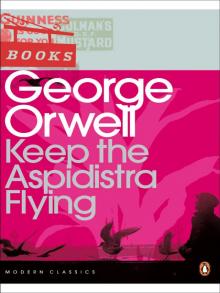 Keep the Aspidistra Flying
Keep the Aspidistra Flying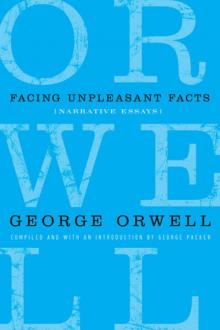 Facing Unpleasant Facts: Narrative Essays
Facing Unpleasant Facts: Narrative Essays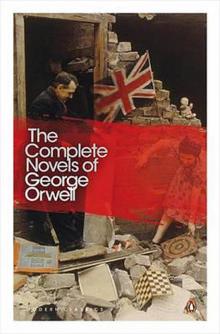 The Complete Novels of George Orwell
The Complete Novels of George Orwell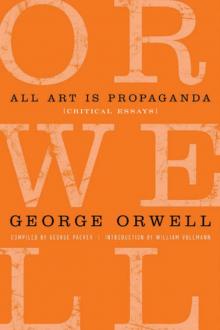 All Art Is Propaganda: Critical Essays
All Art Is Propaganda: Critical Essays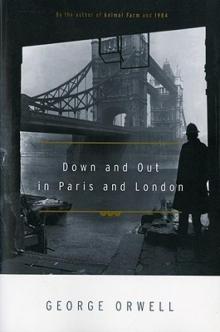 Down and Out in Paris and London
Down and Out in Paris and London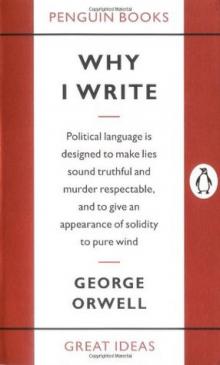 Why I Write
Why I Write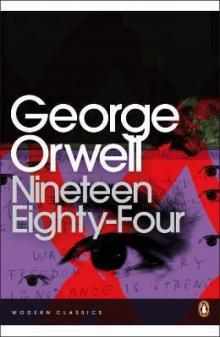 Nineteen Eighty-Four
Nineteen Eighty-Four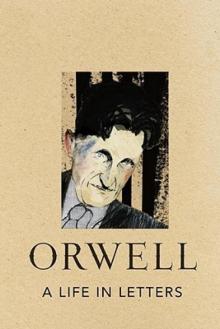 A Life in Letters
A Life in Letters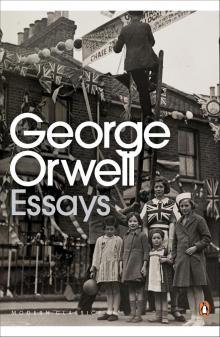 Essays
Essays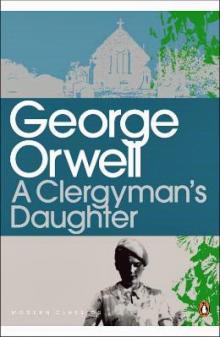 A Clergyman's Daughter
A Clergyman's Daughter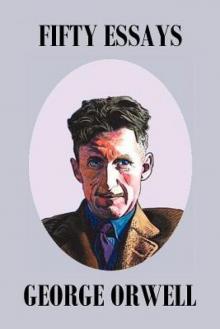 Fifty Orwell Essays
Fifty Orwell Essays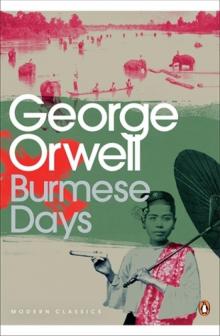 Burmese Days
Burmese Days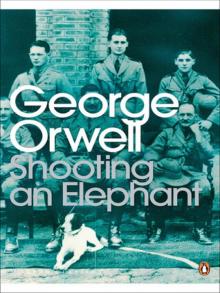 Shooting an Elephant
Shooting an Elephant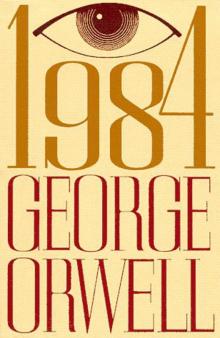 1984 (Penguin)
1984 (Penguin)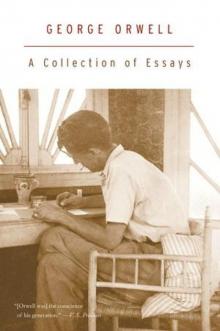 A Collection of Essays
A Collection of Essays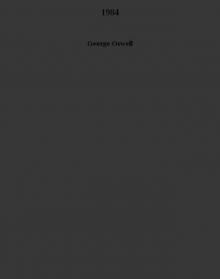 1984
1984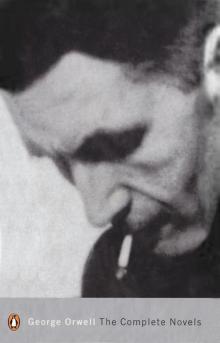 The Complete Novels
The Complete Novels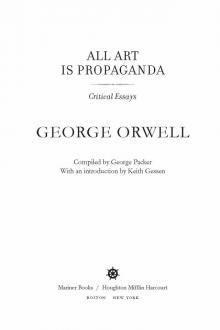 All Art Is Propaganda
All Art Is Propaganda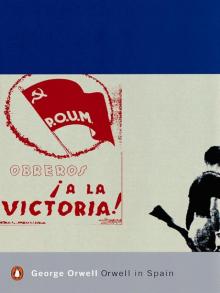 Orwell in Spain
Orwell in Spain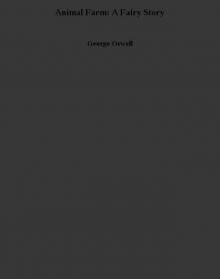 Animal Farm: A Fairy Story
Animal Farm: A Fairy Story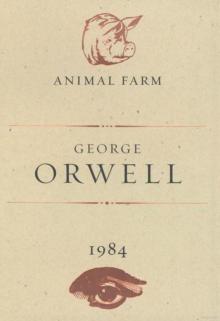 Animal Farm and 1984
Animal Farm and 1984